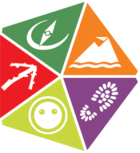ONE Programme
| ONE Programme | |||
|---|---|---|---|
 | |||
| Country | Ireland | ||
|
| |||
The ONE scout programme has been designed using a number of key underlining principles.
• The use of the Scout Method • One programme for all age ranges • Youth Participation within the planning process • Individual personal journeys/experiences
One Programme for all
The principle of ‘ONE programme for all’ means that each age range section delivers the programme in a similar way. Small groups are present in all Sections. Documentation is designed to appeal to the age range of the Section but presents the same concepts to young people in appropriate visual presentations and language. The badge scheme is also similar and the badge designs only signify different age ranges via different coloured designs.
Scout Method
The Scout Method is the way of delivering the programme to young people. The Scout Methodis comprised of eight parts which are equally important and collectively implemented make Scouting what it is. It is through the use of the Scout Method that Scouting achieves its aims in developing young people.
Programme creation
Young people are fully involved in the creation and management of their Scouting experience. This is done via the team and Section Council gatherings. They suggest, design and implement their own adventures and experiences assisted and facilitated by Adult Scouters. This collective experience is the programme of the group.
The Personal Journey
Every Scout is responsible for their Personal Journey/experience of Scouting and plays a hand in designing and planning that journey. The Personal Journey ideal draws a young person to explore the SPICES and enable them to learn, acquire knowledge and develop while participating in the Scout programme. The programme, that young people have designed with the help and assistance of Scouters follows a simple process PLAN, DO, REVIEW. Programmes are planned, activities are executed and the whole process is reviewed. The review process is an important stage as it allows young people to learn by doing, reflect on what has been learnt and carry this knowledge through to the next programme cycle. The review and reflection process is an important part of the personal journey of young people. It allows them to position themselves on their chosen path and provides them with pathways to future discoveries and experiences.
Badges
There are four types of badges available to young people. • Progress Award Badges • Adventure Skills Badges • Special Interest Badges • Boatman Badges scouter
Personal Progress Badges
Personal Progress Badges are awarded to young people in recognition of how they have developed and travelled along their personal Scouting journey. The badges are roughly linked to a ‘Scouting years’ programme. It is not based on individual tests but rather on a concept of bringing young people ‘one step forward’. For some young people this will be easy for others more challenging. It will also be related to maturity of young people as they grow and develop. Scouters therefore need to be fully aware of ‘where their Scouts are at’ so they can have a fuller understanding of how far a young person has travelled in a particular Stage.
Adventure Skills
Adventure skills badges set prescribed detailed requirements to young people to achieve a set standard in a particular adventure skill. The requirements are progressive and ultimately reflect and pave the way to outside recognition by a governing body of a chosen skill. There are currently nine adventure skills badges.
Special Interest Badges
Special interest badges are open ended badges that reflect the interest of the young person undertaking them. Any subject is possible and the requirements are designed by the young person in consultation and agreement with their Scouters. There are five badge designs, badges are presented under a number of heading into which the special interest subject will fall. Heading include -Skill, Physical, Adventure, Community, Environment. Badge requirements will differ depending on the individual Scout undertaking for the badge. The principle of ‘doing one’s best’ is the key feature of badges awarded under this area. The system allows everyone to choose what they want to do, it provides recognition for personal effort, rather than achieving a grade, so everyone has a chance to achieve the badge. Badge requirements are designed to allow exploration of the subject, develop and improve skills, and put the new knowledge into practice, preferably as a practical project which will benefit others.